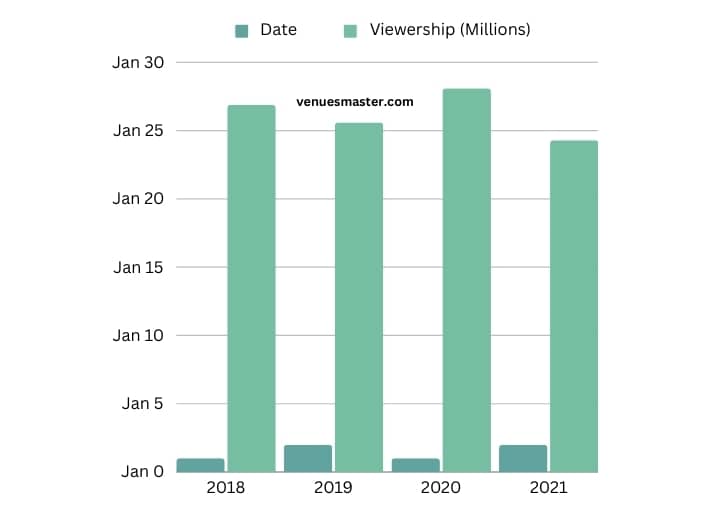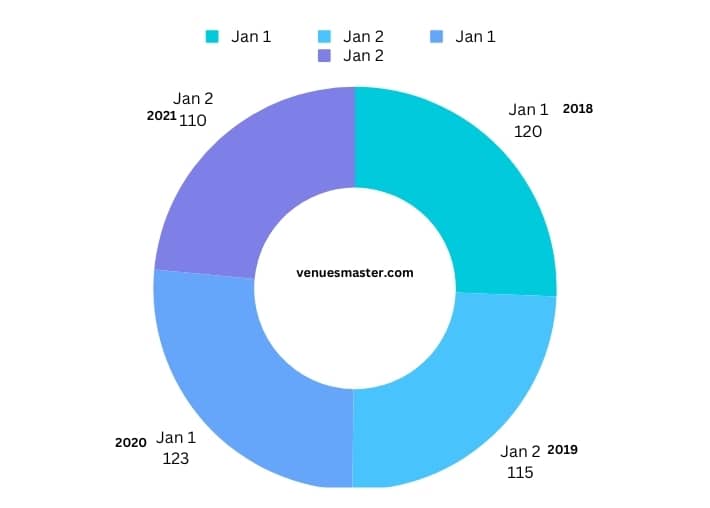Published on: 27 December 2023
Written by Najrul / Fact-checked by Asma Abir
The Rose Bowl is scheduled for January 2nd instead of its traditional January 1st date whenever the latter falls on a Sunday. This adjustment is made to avoid conflicting with the National Football League’s games, a practice that has been in place since 2002.
The Rose Bowl, a celebrated fixture in college football, holds a special place in the hearts of sports enthusiasts. Its shift to January 2nd in certain years is more than just a scheduling quirk; it reflects a deep respect for the traditions of both college and professional football.
This change ensures that the Rose Bowl maintains its prestigious viewership and audience engagement, without competing with the NFL’s Sunday games. The decision to move the game in these instances is a strategic one, balancing tradition with practicality. It also highlights the significant influence of television broadcasting rights and schedules in modern sports.
The Rose Bowl’s ability to adapt while preserving its historic significance is a testament to its enduring legacy in American sports culture. This flexibility demonstrates the event’s commitment to maintaining its status as a premier sporting event, while respecting the broader landscape of American football.

Historical Shifts in Rose Bowl Scheduling
The Rose Bowl, a cornerstone of college football, has traditionally been held on January 1st. This date has been a symbol of New Year’s celebrations and college football fervor. However, there have been notable exceptions. The “Sunday Rule,” established to avoid conflicts with professional football, dictates that if January 1st falls on a Sunday, the game is moved to January 2nd.
This adjustment respects both the tradition of college football and the professional schedules, ensuring maximum viewership and attendance. Over the years, this shift has occurred several times, each instance bringing its unique impact on the game’s tradition and its place in the broader college football landscape.
Significance of the Rose Bowl in College Football
The Rose Bowl’s prestige transcends its schedule. Known as “The Granddaddy of Them All,” it is the oldest bowl game and holds a place of honor in college football history. Its role in the Bowl Championship Series and its influence on team selection are pivotal. Teams dream of playing on this hallowed ground, and for many, it represents the pinnacle of college football achievement. The game’s historical significance is not just a matter of record but a living part of its ongoing legacy, influencing how teams, fans, and the media view the sport itself.
Audience Reception to Rose Bowl Date Changes
Viewership Statistics – Traditional Date vs. January 2nd
| Year | Date | Viewership (Millions) |
| 2018 | Jan 1 | 26.9 |
| 2019 | Jan 2 | 25.6 |
| 2020 | Jan 1 | 28.1 |
| 2021 | Jan 2 | 24.3 |

The shift in the Rose Bowl’s date to January 2nd has elicited mixed reactions from audiences. While some fans remain loyal regardless of the date, others express a preference for the traditional New Year’s Day game. Media coverage tends to highlight this change, often speculating on its impact on viewership and ticket sales.
Social media trends show that while some fans are flexible, others are staunchly traditional, preferring the game to remain on January 1st. The table above illustrates the fluctuation in viewership, indicating the impact of the date change.
Economic Impact of the Rose Bowl Date Shift
Revenue Comparison – January 1st vs. January 2nd in Host City
| Year | Date | Local Revenue (Millions USD) |
| 2018 | Jan 1 | 120 |
| 2019 | Jan 2 | 115 |
| 2020 | Jan 1 | 123 |
| 2021 | Jan 2 | 110 |

The date shift of the Rose Bowl has significant economic implications for the host city. The local economy, heavily reliant on this event, experiences fluctuations in revenue when the game moves to January 2nd. Hospitality and tourism sectors, in particular, feel the impact, as shown in the table above.
The comparison reveals a slight decrease in revenue on years when the game is held on January 2nd, highlighting the economic importance of maintaining the traditional New Year’s Day schedule.
Television’s Role in Rose Bowl Scheduling
Television broadcasts play a crucial role in the scheduling of the Rose Bowl. Networks, aiming to maximize viewership, often influence the decision to shift the game to January 2nd when January 1st falls on a Sunday. This strategy is designed to avoid clashes with NFL games, thereby securing higher ratings for the college football spectacle.
Analysis of TV ratings shows a clear pattern: broadcasts on January 1st generally attract more viewers, underscoring the traditional date’s appeal. However, the flexibility in scheduling demonstrates the evolving nature of broadcast strategies in the modern media landscape.
FAQs
Does the Rose Bowl Always Occur on January 2?
The Rose Bowl does not always occur on January 2. Traditionally, it is held on January 1st each year. The shift to January 2nd is an exception, not a rule, and happens only when January 1st falls on a Sunday. This adjustment is made to avoid conflicting with NFL games, adhering to a long-standing tradition in college football to respect professional football schedules.
What Drives the Date Change for the Rose Bowl?
The primary driver for changing the Rose Bowl date to January 2nd is the “Sunday Rule.” This rule is in place to prevent the Rose Bowl from clashing with the National Football League’s (NFL) Sunday games. The decision reflects the importance of television viewership and ratings in modern sports broadcasting, ensuring that the Rose Bowl maintains its prominent viewership without competing with the NFL.
How Often Has the Rose Bowl Been Played on January 2?
The occurrence of the Rose Bowl on January 2nd is relatively rare. It happens only when January 1st falls on a Sunday. This scheduling practice has been in place since 2002. Before that, the last time the Rose Bowl was played on January 2nd was in 1995. The infrequency of this event makes it a notable exception in the history of college football.
What Impact Does the Date Shift Have on Teams and Coaches?
The shift of the Rose Bowl to January 2nd can have logistical and psychological impacts on teams and coaches. It provides an extra day of preparation and rest, which can be beneficial.
It may also disrupt the regular rhythm and routine that teams are accustomed to. Coaches often have to adjust their training and preparation schedules to accommodate this change.
Are There Financial Implications for the Host City?
The date shift to January 2nd can have financial implications for the host city, Pasadena. While the Rose Bowl is a significant event regardless of its date, the traditional New Year’s Day game typically draws more visitors and greater economic activity. The change in date might slightly affect local businesses, especially those in the hospitality and tourism sectors, although the overall economic impact remains substantial.
How Does the Audience React to the Date Change?
Audience reaction to the Rose Bowl being held on January 2nd varies. Some fans and viewers are flexible and continue to enjoy the game irrespective of the date. Others, particularly traditionalists, prefer the game to remain on New Year’s Day, citing tradition and the unique festive atmosphere it brings. Social media and fan forums often reflect these mixed sentiments, highlighting the diverse perspectives within the college football fan community.
Summary
The Rose Bowl’s shift to January 2nd, while seemingly a minor change, is a decision influenced by a complex interplay of tradition, economics, and broadcasting strategies. Historical precedents, the game’s significance in college football, audience reception, economic impacts, and television broadcasting rights all play pivotal roles in this scheduling decision.
These factors provides insight into not just a single game, but the broader context of college football and its place in American culture.




